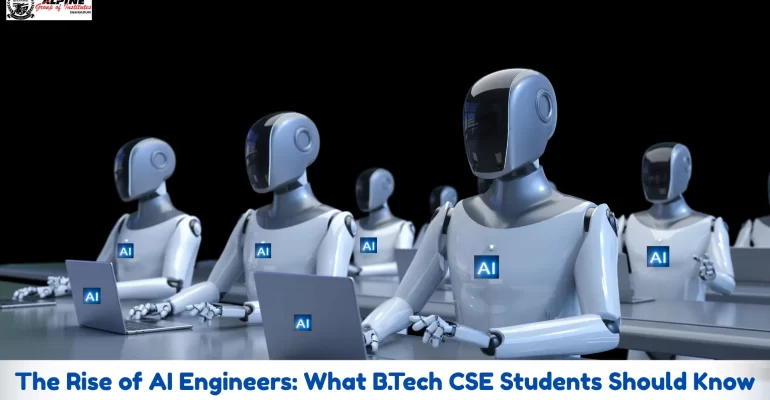The Rise of AI Engineers: What B.Tech CSE Students Should Know
2025-04-12 6:56The Rise of AI Engineers: What B.Tech CSE Students Should Know
Artificial Intelligence (AI) is transforming industries worldwide, reshaping how businesses operate, how people interact with technology, and even how they live their daily lives. As AI technologies evolve, the demand for skilled AI engineers is growing rapidly. For B.Tech CSE (Computer Science and Engineering) students looking to stay ahead in the competitive job market, understanding AI’s impact and how to become proficient in this field is crucial.
The Growing Demand for AI Engineers
The world is witnessing an AI revolution. From self-driving cars and chatbots to predictive analytics and automated customer service, AI is becoming integral to many sectors such as healthcare, finance, education, manufacturing, and entertainment. According to a report by the World Economic Forum, AI will contribute $15.7 trillion to the global economy by 2030.
This rapid expansion has led to an increasing demand for professionals who are well-versed in AI technologies, including machine learning (ML), deep learning (DL), natural language processing (NLP), and robotics. As a result, AI engineers—professionals skilled in designing, building, and maintaining AI systems—are becoming some of the most sought-after talents in the tech industry.
What is an AI Engineer?
An AI engineer is a specialized software engineer who develops AI models and systems. The role involves:
- Designing and developing AI algorithms: Using various techniques, including ML and DL, to create models that can solve real-world problems.
- Data processing: AI engineers work with large datasets to train AI systems, requiring a strong understanding of data cleaning, manipulation, and analysis.
- Machine learning and deep learning: Understanding how neural networks work and implementing them to create systems that improve over time.
- Optimization: Fine-tuning AI models to ensure they perform efficiently and accurately in real-world scenarios.
Skills B.Tech CSE Students Need to Become AI Engineers
For B.Tech CSE students looking to step into the AI field, there are several essential skills they need to master. While AI is an evolving domain, a foundational knowledge of certain subjects is necessary to build expertise.
1. Programming Languages
Programming is the backbone of AI development. B.Tech CSE students should be proficient in the following languages:
- Python: Python is the most widely used programming language in AI due to its simplicity and the vast availability of libraries like TensorFlow, PyTorch, Keras, and scikit-learn.
- Java: While not as common as Python, Java is used in AI for large-scale enterprise applications.
- R: This language is especially useful in statistical analysis and data visualization, making it valuable in AI research and data science.
2. Mathematics and Statistics
AI heavily relies on mathematical concepts. B.Tech CSE students should have a strong grasp of the following areas:
- Linear Algebra: Essential for working with vectors, matrices, and multidimensional data.
- Calculus: Used in optimization problems, backpropagation in neural networks, and gradient descent.
- Probability and Statistics: Vital for data analysis, hypothesis testing, and understanding models’ performance.
3. Machine Learning and Deep Learning
Machine learning and deep learning are the core of AI. B.Tech CSE students should familiarize themselves with the following:
- Supervised and Unsupervised Learning: Learning algorithms that help systems make predictions or decisions based on data.
- Neural Networks and Deep Learning: Concepts like CNNs (Convolutional Neural Networks) and RNNs (Recurrent Neural Networks) are essential in tasks such as image and speech recognition.
- Reinforcement Learning: An area of AI where systems learn optimal actions through trial and error.
- Model Evaluation: Understanding different metrics such as accuracy, precision, recall, F1 score, etc., to assess model performance.
4. Data Structures and Algorithms
A strong foundation in data structures and algorithms is essential for efficient problem-solving in AI. AI engineers often work with large datasets, and an in-depth knowledge of algorithms helps in optimizing performance.
5. Big Data Technologies
With AI often involving massive amounts of data, knowledge of big data tools is valuable:
- Hadoop and Spark: Distributed computing platforms for processing large-scale datasets.
- NoSQL databases like MongoDB for handling unstructured data.
6. Natural Language Processing (NLP)
NLP is a crucial aspect of AI that deals with the interaction between computers and human languages. Familiarity with NLP techniques, such as text classification, sentiment analysis, and named entity recognition, is essential for students interested in this field.
7. Cloud Computing
AI models require significant computational power for training and deployment. As cloud platforms like AWS, Google Cloud, and Microsoft Azure offer scalable infrastructure, understanding cloud services can help students build and deploy AI models efficiently.
Career Opportunities for AI Engineers
As AI continues to grow, so do the career opportunities for AI engineers. Some of the top job roles for B.Tech CSE students in AI include:
- AI Engineer: Responsible for designing and developing AI models and systems.
- Machine Learning Engineer: Focused on creating and optimizing machine learning algorithms.
- Data Scientist: Works with big data and statistical models to derive insights and predictions.
- Deep Learning Engineer: Specializes in deep learning models, particularly in areas like image and speech recognition.
- NLP Engineer: Works with natural language processing algorithms and tools for tasks like text analysis, chatbots, and sentiment analysis.
How B.Tech CSE Students Can Prepare for a Career in AI
1. Online Courses and Certifications
There are numerous online platforms offering courses in AI and related fields. Some popular ones include:
- Coursera: Offers AI, ML, and deep learning courses from top universities like Stanford and Andrew Ng’s Machine Learning course.
- edX: Provides certification programs from institutions like MIT and Harvard.
- Udacity: Known for its AI and machine learning nanodegrees.
2. Participate in AI Competitions
Participating in competitions like Kaggle or Hackathons is an excellent way for students to gain practical experience and showcase their skills. These platforms offer real-world datasets and challenges that help build problem-solving abilities.
3. Build AI Projects
Building personal AI projects is a great way to apply theoretical knowledge. Whether it’s a simple chatbot or a machine learning model for prediction, having hands-on experience in building AI systems is a huge asset for job applications.
4. Internships and Research
Pursuing internships in AI-focused companies or participating in research projects can provide students with industry experience and help them build connections in the field.
Conclusion
The rise of AI is changing the landscape of technology, and AI engineers are at the forefront of this transformation. For B.Tech CSE students, this is a golden opportunity to embrace the growing field of AI and carve a successful career path. By mastering key skills such as programming, machine learning, deep learning, and cloud computing, students can position themselves as experts in one of the most exciting and rewarding domains in tech.
In a rapidly evolving field like AI, staying updated with the latest trends, tools, and technologies is essential. By continuously learning, experimenting, and building hands-on projects, B.Tech CSE students can not only meet the current demand for AI engineers but also drive the innovations of the future.
Frequently Asked Questions (FAQs)
1. Is AI engineering a good career for B.Tech CSE students?
Yes, AI engineering is an excellent career choice due to the growing demand across industries. It offers lucrative salary packages and opportunities to work on cutting-edge technology.
2. How long does it take to become proficient in AI?
Becoming proficient in AI can take 1-2 years, depending on your background and dedication. Continuous learning and practical experience are key to mastery.
3. Do I need a master’s degree to work in AI?
While a master’s degree can help, many AI engineers start with a B.Tech in CSE and gain expertise through self-learning, online courses, and practical experience.
4. What are the top companies hiring AI engineers?
Some top companies hiring AI engineers include Google, Facebook, Amazon, Microsoft, NVIDIA, and numerous startups specializing in AI technologies.
By following the steps outlined above, B.Tech CSE students can successfully transition into the world of AI and build a promising career in this dynamic field.









